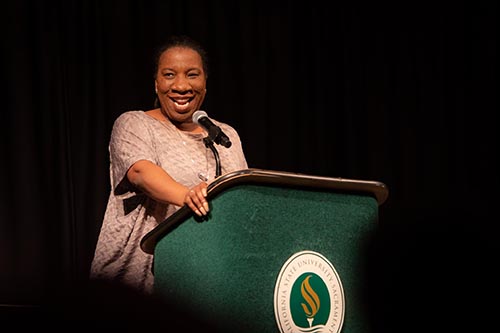 Tarana Burke filled the University Union with people eager to hear her message about helping survivors of sexual violence. (Sacramento State/Jessica Vernone)
Tarana Burke filled the University Union with people eager to hear her message about helping survivors of sexual violence. (Sacramento State/Jessica Vernone)“Me Too” is not about toppling the careers of powerful men or “naming and shaming,” the founder of the movement told a large and spirited evening crowd at Sacramento State on Thursday, Feb. 7, 2019.
Rather, Tarana Burke said, it is about helping survivors of sexual violence heal their psychic wounds.
Burke laid the groundwork for the current movement, which has given voice to millions of people who have suffered sexual abuse or harassment, more than 20 years ago when she founded a nonprofit group to help young women of color. “Me Too” is one of the organization’s centerpieces.
But it was not until 2017, when actress Alyssa Milano used the phrase in a tweet following accusations of sexual misconduct against Hollywood producer Harvey Weinstein, that Burke’s crusade burst into the international spotlight.
More than 1,100 people turned out at the University Union to hear Burke discuss the history and impact of the movement. The lecture was organized by UNIQUE, a Sac State volunteer group that brings cultural events and entertainment to campus.
Burke's visit was her final stop in a tour of CSU campuses.
She told the Sac State crowd, which greeted her with raucous cheers when she appeared on stage in a suede cowboy hat and boots, that college students need to hold their administrations accountable for protecting students against sexual violence.
“Has anyone here said that you deserve safety and protection?” she asked. “Because if they didn’t, you need to demand it.”
In fact, Sac State has been at the forefront of such safety and advocacy efforts.
In 2005, the university introduced the CSU system’s first sexual misconduct policy. In 2014, it launched its Title IX Sexual Violence Awareness Team. Sac State’s “We Care. We Will Help” program includes a victim advocate to help students with concerns about sexual violence. New Sac State students are required to complete a sexual assault tutorial and test, and must score 75 percent or better to register for future classes.
When support systems fail, Burke told the crowd Thursday, students and others must organize to demand policy and culture changes that benefit sexual assault survivors.
“If you’re not getting help from the administration, this is where activism comes in,” she said.
“Visibility and celebrity doesn’t serve me if you’re not going to stand up for what I believe in,” Burke said. “I need all of you to get involved and get the work done. We need to recognize the urgency of this movement. Let’s work together. Let’s heal together.” – Cynthia Hubert
